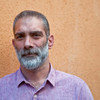A local COVID-19 political lexicon
An appointed official, in this case the interior minister, defies and elbows the elected mayor of a city, for example Istanbul with its 16 million inhabitants because he represents the state also known as the office of the presidency and also because he has a hunch that if these pernicious activities are allowed, then God forbid, HDP municipalities may follow suit and raise money for PKK!
What was that slogan from the pre-COVID19 times: “Think global, act local” or so I suppose. The “acting global” bit should be a hard nut to crack for the self-isolated diplomats based in Ankara. I wonder how they, especially the representatives of the democratic countries, try to make sense and report the emphasis on “state-nation unity” in the fight against… - a virus. Or, for that matter, how they come to grips with the meaning of the religious chants blaring out of mosques every evening after dark. So on, and so forth.
These official guests of ours would probably also find themselves scratching their heads when the government forbids the citizens to show solidarity with their own municipalities as they would again probably do to figure out the interior minister’s accusation that the local governments try actually to become that: “Governments within the government.” But wait a minute: We don’t have a government per se anymore. Since we acceded to the new presidential regime, we just have appointed officials forming a cabinet.
Then again, when talking about the “state”, do we mean the “government”? President and ruling Justice and Development Party (AKP) Chair Erdoğan leaves no doubt while casually conversing via Skype or Zoom with his AKP mayors when he states: “Our state, in other words the office of the presidency.” There you have it, “the state” or “the office of the presidency” kickstarts a campaign to rival and then to effectively cancel altogether similar solidarity campaigns by the opposition CHP run municipalities asking for citizens to rush to the help of their state, which in turn means “the office of the presidency.”
Ergo, an appointed official, in this case the interior minister, defies and elbows the elected mayor of a city, for example Istanbul with its 16 million inhabitants because he represents the state also known as the office of the presidency and also because he has a hunch that if these pernicious activities are allowed, then God forbid, HDP municipalities may follow suit and raise money for PKK! But wait, isn’t the HDP a legal political party with the third largest group in the national parliament? It was, the last time I checked but never mind.
Anyway, let’s not get allow ourselves to get lost in these frivolities such as the rule of law or the freedom of expression, and try to continue with our cool-headed analysis to lend our helping hand to our much esteemed foreign friends based in Ankara for them to be able to better understand our beloved country in these difficult pandemic times. Following the lockdown of senior citizens of over 65 years of age, now came the turn of those under 20. However, there is a workforce of under 20 both registered and un-registered. What will happen to their households?
The president rules by decree and his cabinet ministers by issuing circulars. Therefore, the appointed interior minister felt the urge or had an afterthought to issue a second addendum to the original restrictive circular and declared that members of the workforce under 20 will actually be allowed to step outside. No, no paid leave in sight, on the contrary, the state a.k.a. the office of the presidency eagerly awaits the much needed monied contributions of its loyal citizens. The citizens indirectly contribute anyway to the campaign as the biggest contributors to date of that same campaign are public banks and the like, the coffers of which are filled by taxes.
By way of conclusion, now that a murky concept like “social state” which Turkey claims to be one via its constitution is explained, let’s briefly wander into the territory of “polarization” within that context. Otherwise our dispassionate analysis of the current local state of play may risk to remain incomplete. We are then in a polarized society in which some naively keep on insisting that they are the citizens of a secular republic. By default, they also claim to have civic rights alongside their civic duties. They entertain a (false?) assumption that they have agency in the decision-making process, that the administration should be held accountable of its deeds and that all are equal under the law. Whereas others, they are of the opinion that the state is the office of the presidency.
Stay safe and tuned for our next episode.

